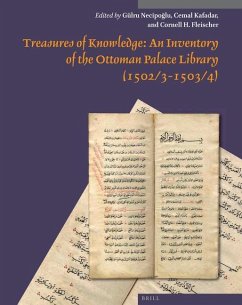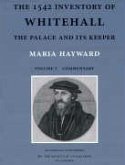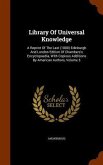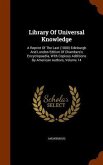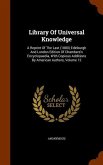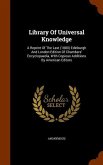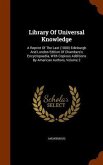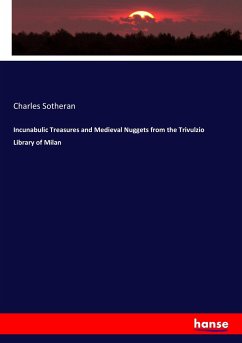The subject of this two-volume publication is an inventory of manuscripts in the book treasury of the Topkapi Palace in Istanbul, commissioned by the Ottoman sultan Bayezid II from his royal librarian Atufi in the year 908 (1502-3) and transcribed in a clean copy in 909 (1503-4). This unicum inventory preserved in the Oriental Collection of the Library of the Hungarian Academy of Sciences (Magyar Tudományos Akadémia Könyvtára Keleti Gy jtemény, MS Török F. 59) records over 5,000 volumes, and more than 7,000 titles, on virtually every branch of human erudition at the time. The Ottoman palace library housed an unmatched encyclopedic collection of learning and literature; hence, the publication of this unique inventory opens a larger conversation about Ottoman and Islamic intellectual/cultural history. The very creation of such a systematically ordered inventory of books raises broad questions about knowledge production and practices of collecting, readership, librarianship, and thearts of the book at the dawn of the sixteenth century.
The first volume contains twenty-eight interpretative essays on this fascinating document, authored by a team of scholars from diverse disciplines, including Islamic and Ottoman history, history of science, arts of the book and codicology, agriculture, medicine, astrology, astronomy, occultism, mathematics, philosophy, theology, law, mysticism, political thought, ethics, literature (Arabic, Persian, Turkish/Turkic), philology, and epistolary. Following the first three essays by the editors on implications of the library inventory as a whole, the other essays focus on particular fields of knowledge under which books are catalogued in MS Török F. 59, each accompanied by annotated lists of entries. The second volume presents a transliteration of the Arabic manuscript, which also features an Ottoman Turkish preface on method, together with a reduced-scale facsimile.
The first volume contains twenty-eight interpretative essays on this fascinating document, authored by a team of scholars from diverse disciplines, including Islamic and Ottoman history, history of science, arts of the book and codicology, agriculture, medicine, astrology, astronomy, occultism, mathematics, philosophy, theology, law, mysticism, political thought, ethics, literature (Arabic, Persian, Turkish/Turkic), philology, and epistolary. Following the first three essays by the editors on implications of the library inventory as a whole, the other essays focus on particular fields of knowledge under which books are catalogued in MS Török F. 59, each accompanied by annotated lists of entries. The second volume presents a transliteration of the Arabic manuscript, which also features an Ottoman Turkish preface on method, together with a reduced-scale facsimile.
"..finding a publication that so deeply mines its core text for discussion and presents it to the reader from myriad angles rather than simply offering a facsimile or transcription bereft of analysis or contextualization is very welcome. Indeed, the book's comprehensively cross-disciplinary nature is an impressive achievement and highlights the value of scholars from different fields working together for mutual benefit. The many subjects represented in the inventory, such as philosophy, medicine, theology, and Sufism, are capably outlined and analyzed. Much exists in these volumes that researchers in these numerous fields will find useful and interesting. However, the work will of course also be valuable to scholars in other subjects not directly represented in A ufi's inventory, such as library studies and the history of collections, the history of art and architecture, and women's studies... Those desiring to publish complex primary sources should pay attention to the approach taken by the volume editors, both in terms of the wide-ranging publication itself but also to the preparatory workshop stage. Although access to the necessary resources is unfortunately not equally available across institutions, this publication demonstrates what might be achieved through interdisciplinary collaboration and a sensitivity to the contexts surrounding a primary source and its subject matter."
Cailah Jackson in: Nazariyat Volume 6, Issue 2 (2020).
"...the extensive case study presented in this publication will certainly constitute a key reference work for further research on the history of libraries in the post-medieval Ottoman and Muslim world."
Fabrizio Speziale in: Bulletin of SOAS
"...eine inhaltlich unendlich ergiebige Verzeichnis in zwei üppig illustrierten Bänden".
Klaus Kreisner in: Frankfurter Allgemeine Zeitung, June 10, 2020.
"Netice olarak diyebiliriz ki bu envanter sadece basit bir kütüphane envanteri degil, bunun çok ötesinde tarihî deger tasiyan bir vesikadir. Treasures of Knowledge adli eser, gerek otuzdan fazla degerli müellifi, gerek hacmi, gerek kapsami ve derinligi açisindan Türk-Islam kütüphaneleri tarihi alanina anitsal bir katkidir. Ayrica eser bu tarz tarih vesika ve belgelerin nasil çalisilmasi gerektigi konusunda da güzel bir örnektir. Bundan dolayi bu eserin yayinlanmis olmasini büyük bir mutlulukla karsiliyor, bir an önce Türkçeye kazandirilmasi ya da en azindan yurdumuzun önemli kütüphanelerinde yerini almasini cani gönülden temenni ediyorum."
Hüseyin Sen in: Yeni Safak, October 15, 2021.
"As for the publication as a whole, it is a very wide-ranging and important contribution to Ottoman cultural studies which does indeed justify the imposing title Treasures of Knowledge."
Muhammad Isa Waley, British Library in: The Muslim World Book Review Volume41, Issue 4 (2021).
"In sum, this two-volume set is a detailed work of philological and analytic labor, completed by a team and targeted towards specialists in Ottoman, Islamic, and Early Modern Intellectual and Literary History. Given that the inventory contains 7,200 titles in about 5,700 volumes, with many of the extant copies scattered around various collections, the task at hand was truly gargantuan. The work is thus a great service to scholarship that historians, philologists, art historians, and historians of science will make recourse to for many years to come. Moreover, for anyone who would like to browse the library of an Ottoman sultan, these volumes offer them their chance."
Henry Shapiro, The Van Leer Jerusalem Institute in: Early Science and Medicine Volume 26, Issue 3 (2021).
Cailah Jackson in: Nazariyat Volume 6, Issue 2 (2020).
"...the extensive case study presented in this publication will certainly constitute a key reference work for further research on the history of libraries in the post-medieval Ottoman and Muslim world."
Fabrizio Speziale in: Bulletin of SOAS
"...eine inhaltlich unendlich ergiebige Verzeichnis in zwei üppig illustrierten Bänden".
Klaus Kreisner in: Frankfurter Allgemeine Zeitung, June 10, 2020.
"Netice olarak diyebiliriz ki bu envanter sadece basit bir kütüphane envanteri degil, bunun çok ötesinde tarihî deger tasiyan bir vesikadir. Treasures of Knowledge adli eser, gerek otuzdan fazla degerli müellifi, gerek hacmi, gerek kapsami ve derinligi açisindan Türk-Islam kütüphaneleri tarihi alanina anitsal bir katkidir. Ayrica eser bu tarz tarih vesika ve belgelerin nasil çalisilmasi gerektigi konusunda da güzel bir örnektir. Bundan dolayi bu eserin yayinlanmis olmasini büyük bir mutlulukla karsiliyor, bir an önce Türkçeye kazandirilmasi ya da en azindan yurdumuzun önemli kütüphanelerinde yerini almasini cani gönülden temenni ediyorum."
Hüseyin Sen in: Yeni Safak, October 15, 2021.
"As for the publication as a whole, it is a very wide-ranging and important contribution to Ottoman cultural studies which does indeed justify the imposing title Treasures of Knowledge."
Muhammad Isa Waley, British Library in: The Muslim World Book Review Volume41, Issue 4 (2021).
"In sum, this two-volume set is a detailed work of philological and analytic labor, completed by a team and targeted towards specialists in Ottoman, Islamic, and Early Modern Intellectual and Literary History. Given that the inventory contains 7,200 titles in about 5,700 volumes, with many of the extant copies scattered around various collections, the task at hand was truly gargantuan. The work is thus a great service to scholarship that historians, philologists, art historians, and historians of science will make recourse to for many years to come. Moreover, for anyone who would like to browse the library of an Ottoman sultan, these volumes offer them their chance."
Henry Shapiro, The Van Leer Jerusalem Institute in: Early Science and Medicine Volume 26, Issue 3 (2021).

